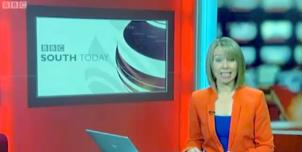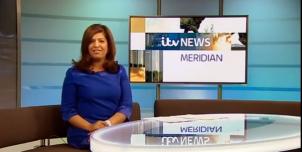Full Freeview on the Oxford (Oxfordshire, England) transmitter
| Google Streetview | Google map | Bing map | Google Earth | 51.790,-1.179 or 51°47'25"N 1°10'46"W | OX3 9SS |
The symbol shows the location of the Oxford (Oxfordshire, England) transmitter which serves 410,000 homes. The bright green areas shown where the signal from this transmitter is strong, dark green areas are poorer signals. Those parts shown in yellow may have interference on the same frequency from other masts.
This transmitter has no current reported problems
The BBC and Digital UK report there are no faults or engineering work on the Oxford (Oxfordshire, England) transmitter._______
Digital television services are broadcast on a multiplexes (or Mux) where many stations occupy a single broadcast frequency, as shown below.
64QAM 8K 3/4 27.1Mb/s DVB-T MPEG2
DTG-12 QSPK 8K 3/4 8.0Mb/s DVB-T MPEG2
H/V: aerial position (horizontal or vertical)
Which Freeview channels does the Oxford transmitter broadcast?
If you have any kind of Freeview fault, follow this Freeview reset procedure first.Digital television services are broadcast on a multiplexes (or Mux) where many stations occupy a single broadcast frequency, as shown below.
64QAM 8K 3/4 27.1Mb/s DVB-T MPEG2
DTG-12 QSPK 8K 3/4 8.0Mb/s DVB-T MPEG2
H/V: aerial position (horizontal or vertical)
Which BBC and ITV regional news can I watch from the Oxford transmitter?

BBC South (Oxford) Today 0.4m homes 1.6%
from Oxford OX2 7DW, 6km west-southwest (258°)
to BBC South (Oxford) region - 6 masts.
BBC South (Oxford) Today shares 50% content with Southampton service

ITV Meridian News 0.9m homes 3.4%
from Whiteley PO15 7AD, 102km south (182°)
to ITV Meridian/Central (Thames Valley) region - 15 masts.
Thames Valley opt-out from Meridian (South). All of lunch, weekend and 50% evening news is shared with all of Meridian+Oxford
How will the Oxford (Oxfordshire, England) transmission frequencies change over time?
| 1950s-80s | 1984-97 | 1997-98 | 1998-2011 | 2011-13 | 2013-18 | 2013-17 | 23 May 2018 | ||
| VHF | C/D E | C/D E | C/D E | C/D E | C/D E T | W T | W T | ||
| C2 | BBCtvwaves | ||||||||
| C29 | SDN | ||||||||
| C31 | com7 | com7 | |||||||
| C37 | com8 | com8 | |||||||
| C41 | BBCA | ||||||||
| C44 | D3+4 | ||||||||
| C46 | _local | ||||||||
| C47 | BBCB | ||||||||
| C49tv_off | C5waves | C5waves | |||||||
| C50tv_off | SDN | SDN | |||||||
| C51tv_off | LOX | LOX | |||||||
| C53tv_off | C4waves | C4waves | C4waves | +BBCA | +BBCA | +BBCA | |||
| C55tv_off | ArqB | ArqB | ArqB | com7tv_off | |||||
| C56tv_off | COM8tv_off | ||||||||
| C57tv_off | BBC1waves | BBC1waves | BBC1waves | BBCB | BBCB | BBCB | |||
| C59tv_off | -ArqA | -ArqA | -ArqA | ||||||
| C60tv_off | ITVwaves | ITVwaves | ITVwaves | -D3+4 | -D3+4 | -D3+4 | |||
| C62 | SDN | ||||||||
| C63 | BBC2waves | BBC2waves | BBC2waves |
tv_off Being removed from Freeview (for 5G use) after November 2020 / June 2022 - more
Table shows multiplexes names see this article;
green background for transmission frequencies
Notes: + and - denote 166kHz offset; aerial group are shown as A B C/D E K W T
waves denotes analogue; digital switchover was 14 Sep 11 and 28 Sep 11.
How do the old analogue and currrent digital signal levels compare?
| Analogue 1-4 | 500kW | |
| BBCA, D3+4, BBCB | (-7dB) 100kW | |
| SDN, ARQA, ARQB | (-10dB) 50kW | |
| Analogue 5 | (-11dB) 40kW | |
| com8 | (-14.7dB) 17.1kW | |
| com7 | (-14.8dB) 16.4kW | |
| Mux 1*, Mux 2*, LOX | (-17dB) 10kW | |
| Mux C*, Mux D* | (-18dB) 8kW | |
| Mux A*, Mux B* | (-19.2dB) 6kW |
Which companies have run the Channel 3 services in the Oxford transmitter area
|
|
Monday, 10 October 2011
Chris, sorry for delay, yes. What I am getting is a huge amount of static on the fly lead from the Thompson box. So much in fact that the spark is clearly visible when removing the lead.
On another set, which was working fine on it's own outside aerial I have had to re-instate the booster for channels 15/24 etc. SN3 4ST
| link to this comment |
Robert's: mapR's Freeview map terrainR's terrain plot wavesR's frequency data R's Freeview Detailed Coverage
M
Michael Dalgleish9:15 PM
Robert - if you are seeing a spark, you may have a dangerous situation. Suggest you resolve that first before doing anything else! Mike
| link to this comment |
P
Paul10:17 PM
I 've found where I read that Sutton Coldfield uses ch50: it's in the Television Viewers' Guide.
I'm pleased that I'm not going mad.
Thanks for the correction.
| link to this comment |
Tuesday, 11 October 2011
N
Nicholas10:34 AM
Luton
Sorry, I should have given the whole picture. I'm getting EPG for Sandy Heath, and some (but not all) Crystal Palace, but nothing at all for Oxford. My box has also allocated ITV Oxford at position 3, but put BBC Oxford in the 900s. I'm getting all 5 muxes (6 in the case of Crystal Palace) on all three transmitters, so presumably it's not that I'm missing the mux that the EPG is transmitted on.
| link to this comment |
Nicholas's: mapN's Freeview map terrainN's terrain plot wavesN's frequency data N's Freeview Detailed Coverage
M
Mike Dimmick3:09 PM
Nicholas: The standard Freeview EPG is transmitted on all multiplexes. Each multiplex transmits its own information more frequently than others, and information about programmes coming up sooner more frequently than later events, but it does all get sent and repeat after a few minutes. Some boxes can get very confused with a mix of different services from different transmitters.
I'd start off by doing a full reset or first-time installation with the aerial unplugged, then doing a manual search for the transmissions from your most preferred transmitters. If that is then reliable, do a manual search for just the regional services (BBC A and D3&4) on your second preferred transmitter, which will put those services in the 800s. If it stops being reliable after that, you'll know where the problem lies.
Some equipment does still use a proprietary EPG. Top-Up TV's EPG is attached to TOPUP Anytime 1, Guide+ to bid.tv, and RadioTimes Extra to Television X. All three are on Mux A/SDN.
| link to this comment |
M
Mike Dimmick3:38 PM
Paul: Ofcom's official documentation of Sutton Coldfield's frequencies was re-issued in January this year, to move BBC B's allocated channel from C50 to C40, and ArqB from C49 to C39. This is part of the plan to free C61 and C62 for 4G mobiles - basically C39 and C40 were going to be freed but are now kept. However, a direct move from C62 to C40 or C61 to C39 would affect a lot of people, as they aren't in the same group, so the compromise is *generally* to move allocations of C62 to C50 and C61 to C49, and move C50 to C40 and C49 to C39, where there is a clash.
Yes, this means there will be another retune at Oxford some time in the next two years, to move SDN from C62 to somewhere else, although it *should* remain in Group C/D.
Hannington C50 isn't particularly low at 20kW, that actually made it joint equal most powerful pre-switchover transmitter, with Crystal Palace, Rowridge and Sandy Heath! Post-switchover PSB power levels are only 4 dB higher at 50 kW (COM power levels are 1 dB higher than at present, 25 kW).
| link to this comment |
A
Alex Wilde3:51 PM
Steve P / Matthew;
Thanks for responding, problem now fixed - it was a dodgy cable.
| link to this comment |
N
Nicholas4:44 PM
Luton
Mike Dimmick:
Thanks for your reply. My box is ex Top up TV (Thomson; can't remember the model) and doesn't have a manual scan facility.
| link to this comment |
Nicholas's: mapN's Freeview map terrainN's terrain plot wavesN's frequency data N's Freeview Detailed Coverage
S
Steve P5:12 PM
Nicholas - you can unplug and replug the aerial lead during auto tuning to pick the channels you want.
| link to this comment |
Wednesday, 12 October 2011
P
Paul7:50 AM
"Paul: Ofcom's official documentation of Sutton Coldfield's frequencies was re-issued in January this year, to move BBC B's allocated channel from C50 to C40...
Hannington C50 isn't particularly low at 20kW, that actually made it joint equal most powerful pre-switchover transmitter, with Crystal Palace, Rowridge and Sandy Heath! ..." [ Mike Dimmick ].
Thanks for that, Mike. A friend near Banbury was pleased that she had done her own retunes, with no help from me. When I checked her equipment, two of the five MUXes had tuned to Hannington instead of Oxford. Hannington's signals are a problem in this area, despite their current slightly low power.
| link to this comment |
Select more comments
Your comment please





